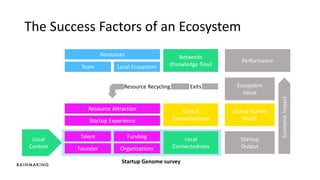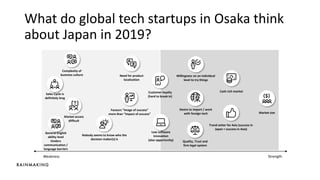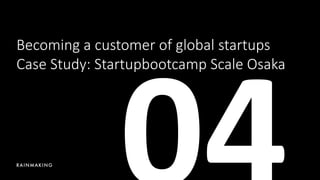The View from Overseas - Creating Venture Ecosystems by Utilizing Kansai's Strengths
- 1. The View from Overseas Creating Venture Ecosystems by Utilizing Kansai’s Strengths Joshua Flannery CEO, Rainmaking Innovation Japan LLC (RMIJ)
- 3. The Global Entrepreneurship Development Institute (GEDI) rankings represent the relative health of national entrepreneurial ecosystems around the world, based on the methodology covering 14 key pillars of entrepreneurship. (www.thegedi.org) Global Rank 1 Global Rank 19 Global Rank 57 Global Rank 10 Global Rank 16 Global Rank 28 Global Rank 5 United States Chile South Africa France Israel Japan Australia Japan – rank #28 GDP per capita $35,653 Individual variables 53.1% Institutional variables 89.4% GEI 51.5% The GEDI Rankings
- 4. The Success Factors of an Ecosystem Resources Team Local Ecosystem Networks (Knowledge flow) Performance Resource Attraction Startup Experience Talent Funding Founder Organizations Global Connectedness Local Connectedness Ecosystem Value Global Market Reach Startup Output Local Context EconomicImpact Resource Recycling Exits Startup Genome survey
- 5. What do global tech startups think about doing business in Osaka and Kansai?
- 6. What do global tech startups in Osaka think about Japan in 2019? Weakness Strength General English ability level hinders communication / language barriers Sales Cycle is definitely long Quality, Trust and firm legal system Low software innovation (also opportunity) Desire to import / work with foreign tech Need for product localization Complexity of business culture Willingness on an individual level to try things Market access difficult Trend setter for Asia (success in Japan = success in Asia) Cash rich market Market size Nobody seems to know who the decision maker(s) is Customer loyalty (hard to break in) Favours “image of success” more than “impact of success”
- 7. Leverage Kansai Strengths for Opportunities Opportunities Building Collaboration Using the learnings for recent collaboration projects between Kansai corporations and foreign startups, enable a larger number of corporates across Kansai to become partners and customers of local and foreign startups. Strengths Market size Large concentration of SME’s and corporates for potential B2B sales and partnerships. Recent corporate collaboration with startups. Weakness Enterprise Culture Enterprise culture (Japan wide) is more risk adverse than nearby countries. Not much experience or know-how within corporates regarding working with (foreign) startups. Train Innovation Skills Consolidate Kansai university network via new platforms, programs and partnerships that bring together students across Kansai and train them on “innovation skills”. CVCs Growing amount of Corporate Venture Capital in Kansai. Fragmented Most universities have mini-ecosystems built around them which a strong alone but do not naturally connect with other university ecosystems across Kansai. High competition over skills (especially bilingual talent). Bring together talent Utilise programs that bring in foreign startups to attract more serial entrepreneurs from abroad as mentors and creating more potential deal flow to attract early stage investors to Kansai. Academic Large number of very high quality universities and educational institutions. Lack of Mentoring Lack of serial entrepreneurs and Angel investors for mentoring and seed funding in Kansai based startups. Increase Activities Conduct more activity across programs, platforms and partnerships that join Kansai together as “one ecosystem” Strong Growth Growing capability and resources across ecosystem Disconnected Cities Difficult to cut-through noise from other cities (Tokyo, Fukuoka) and perceived disconnect between Osaka, Kyoto and Kobe.
- 8. Human Resources Case Study: the State of New South Wales, Australia
- 9. Case Study Consolidating University Networks The State government of NSW has established both a consolidated organization for all universities and state colleges to gather students interested in entrepreneurship in the Sydney School of Entrepreneurship. They have also gathered major startup supporters including co-working spaces, incubators, accelerators and corporations in the Sydney Startup Hub.
- 10. Virtual Internship Program 1,259 students trained in innovation Internship program Within 3 months. Sydney School of Entrepreneurship Sydney Startup Hub 11 universities and colleges Thousands of students 4 co-working spaces, many accelerators 480+ startups
- 11. Becoming a customer of global startups Case Study: Startupbootcamp Scale Osaka
- 12. Startupbootcamp Scale Osaka CASE STUDY Scouting Themes Partners In Japan • Wellness & Healthtech • Sportstech • Foodtech • Mobility • Smart Living • Lifestyle & Tourism • Smart Cities • Adtech & Mediatech Scouting 3,000+ startups Travelled 14 cities 455 applications 13 PoC candidates Mentors in Japan
- 13. Ripple on effects of SBC in Osaka & Kansai
- 14. University talent development and pipeline building: example is graduate internship opportunities with foreign startups for Doshisha Business School MBA program students. PR and marketing impact attracting more visitors to Kansai: example is articles in The Yomiuri Shimbun, Nikkan Kogyo Shimbun and various foreign media that have picked up the story above this impactful program Corporate staff learning new innovation skills: example is work experience in English with innovation team of SBC for Japanese partner staff Higher rates of innovation (direct and indirect): all seven Japanese companies able to introduce new technologies to Japan via the program Utilization and optimization of existing assets: example is one Japanese partner is using existing assets introduce new technology to its customers New corporate to corporate collaborations: some Japanese companies (partners) are collaborating on the same projects Economic benefit (local and national economies): example is Some startup and corporate collaboration already positioned to generate new revenue














